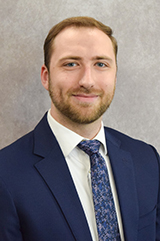From USD to D.C.: How Matt Reesman Integrates South Dakota Insights into International Economics

Reesman has the unique opportunity to bridge economic value with global economic impact in his career as an international economist at the U.S. International Trade Commission in Washington, D.C.
The commission is an independent, bipartisan federal agency. It plays a vital role in international trade policymaking – including Title XII trade investigations – and provides trade expertise to the executive branch and Congress.
“As an economist, my role primarily involves providing trade expertise to executive and congressional stakeholders, as well as building and estimating quantitative models of international trade to help answer questions of interest,” Reesman said.
Originally from Omaha, Nebraska, Reesman attended USD and received his BBA in economics, with minors in finance and music, graduating summa cum laude in 2019.
“USD was the nexus of several important life experiences for me,” he said. “I don’t think I’d be in the same place I am today without some of the formative experiences I had as a student here.”
Honoring His Love of Research
During his time as a student, Reesman was a member of the USD Honors Program, and due to his involvement in Honors as well as the various classes within his academic program, Reesman’s love of the research process grew.
“My classes established a foundation for my knowledge of economic theory and quantitative skills, which served as a transformative step throughout graduate school,” said Reesman, who went on to earn a M.A. in economics in 2022 and a Ph.D. in economics in 2024 from Clemson University.
Those steps were guided by Beacom School of Business faculty members Mike Allgrunn, Ph.D., and David Carr, Ph.D., whom Reesman credits with significant guidance throughout his honors thesis research and graduate application process.
Their classes guaranteed his continuing interest in economics; specifically, Carr’s yearlong course sequence of international macroeconomics and international trade, which sparked Reesman’s interest in trade research.
In addition to academics, Reesman found himself engrossed in the camaraderie of extracurricular clubs like Delta Tau Delta, Delta Sigma Pi, Beta Gamma Sigma, Omicron Delta Epsilon, Mortar Board Honor Society, and Coyote Capital Management. In Coyote Capital Management, Reesman served as a senior analyst and discovered his strong interest in quantitative modeling.
He also participated in music ensembles, and even met his significant other at USD.
“South Dakota has been a focal point in my life and my experiences at USD were sources of personal and professional growth that have served me in my education and career. I have become a better teammate, leader, collaborator, and communicator, and a more organized, thoughtful person because of it,” he said.
Additionally, his experiences have been essential in fostering a deeper understanding of South Dakota to those unfamiliar, as he often encounters professional stakeholders and colleagues who may only know South Dakota as “the Mount Rushmore state.”
“I’ve made it a priority to share stories of this beautiful state filled with humble, hard-working, and pleasant people. Hopefully, through these small conversations, I am influencing their view of South Dakota and painting a nice portrait,” he said.
Integrating South Dakota’s Economic Landscape into Policy Research
Likewise, Reesman integrates his background in economics and domestic knowledge of South Dakota into his professional responsibilities and research.
One example consists of a report Reesman is working on, which relates to the distributional effects of trade on U.S. workers. In this report, he is researching the differential effects of trade across U.S. regions, like South Dakota, and across different underserved communities.
Reesman also maintains a strategic research agenda, where he conducts research and writes scholarly articles that contribute to the academic literature on international trade and trade policy, which helps build capacity for the policymaking functions of the agency.
Lately, that research has consisted of building a new dataset on trade agreement provisions and integrating it with existing information on international migration and trade flows. He also develops dynamic spatial trade models to estimate the impact of different kinds of trade policy on the trade, migration flows, population, and income of countries, with a focus on the U.S.
“South Dakota is home to a lot of important domestic industries,” he said. “I do my part by providing perspectives to economists and staff at the commission on specifics of the South Dakota business environment that I became familiar with during my time at USD’s business school.”
This knowledge, Reesman says, “comes in handy for policy work that may focus specifically on South Dakota or other Midwestern states, or specific industries important to the local economy.”
And, though he’s out in D.C., Reesman stays connected with USD through LinkedIn and newsletters, keeping tabs on the latest developments in the business school, economics department and professional organizations he was part of.
“I just hope my experience living and learning at the University of South Dakota allows me to continue to share new perspectives on issues of interest to international trade policymakers,” Reesman said.
By continuing to integrate his experiences and insights from USD into his work, Reesman aims to influence policy discussions that resonate with the unique economic landscape of his home state and beyond.




